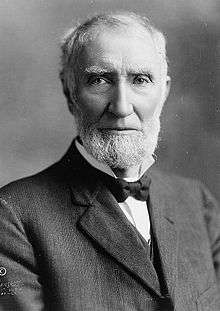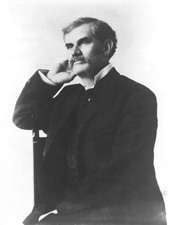United States House of Representatives elections, 1904
|
| ||||||||||||||||||||||
| ||||||||||||||||||||||
All 386 seats to the United States House of Representatives 194 seats were needed for a majority | ||||||||||||||||||||||
|---|---|---|---|---|---|---|---|---|---|---|---|---|---|---|---|---|---|---|---|---|---|---|
| ||||||||||||||||||||||
| ||||||||||||||||||||||
Elections to the United States House of Representatives were held in 1904 to elect members of the 59th Congress, and coincided with the election to a full term of President Theodore Roosevelt.
Roosevelt's popularity swept many Republican house candidates into office, cementing their majority over the opposition Democratic Party. Because Roosevelt came from a liberal wing of the Republican Party, his ideology was prevalent among freshman representatives. Progressive Republicanism mobilized a new base of support and proved to be especially popular among the Protestant middle-class workers who held jobs in business or in the front offices of industrial facilities.
Election summaries
| 251 | 135 |
| Republican | Democratic |
| State | Type | Total seats |
Republican | Democratic | ||
|---|---|---|---|---|---|---|
| Seats | Change | Seats | Change | |||
| Alabama | District | 9 | 0 | 9 | ||
| Arkansas | District | 7 | 0 | 7 | ||
| California | District | 8 | 8 | 0 | ||
| Colorado | District +at-large |
3 | 3 | 0 | ||
| Connecticut | District +at-large |
5 | 5 | 0 | ||
| Delaware | At-large | 1 | 1 | 0 | ||
| Florida | District | 3 | 0 | 3 | ||
| Georgia | District | 11 | 0 | 11 | ||
| Idaho | At-large | 1 | 1 | 0 | ||
| Illinois | District | 25 | 24 | 1 | ||
| Indiana | District | 13 | 11 | 2 | ||
| Iowa | District | 11 | 11 | 0 | ||
| Kansas | District +at-large |
8 | 8 | 0 | ||
| Kentucky | District | 11 | 2 | 9 | ||
| Louisiana | District | 7 | 0 | 7 | ||
| Maine[Note 3] | District | 4 | 4 | 0 | ||
| Maryland | District | 6 | 3 | 3 | ||
| Massachusetts | District | 14 | 11 | 3 | ||
| Michigan | District | 12 | 12 | 0 | ||
| Minnesota | District | 9 | 9 | 0 | ||
| Mississippi | District | 8 | 0 | 8 | ||
| Missouri | District | 16 | 10 | 6 | ||
| Montana | At-large | 1 | 1 | 0 | ||
| Nebraska | District | 6 | 6 | 0 | ||
| Nevada | At-large | 1 | 0 | 1 | ||
| New Hampshire | District | 2 | 2 | 0 | ||
| New Jersey | District | 10 | 9 | 1 | ||
| New York | District | 37 | 26 | 11 | ||
| North Carolina | District | 10 | 1 | 9 | ||
| North Dakota | District | 2 | 2 | 0 | ||
| Ohio | District | 21 | 20 | 1 | ||
| Oregon[Note 3] | District | 2 | 2 | 0 | ||
| Pennsylvania | District | 32 | 31 | 1 | ||
| Rhode Island | District | 2 | 1 | 1 | ||
| South Carolina | District | 7 | 0 | 7 | ||
| South Dakota | At-large | 2 | 2 | 0 | ||
| Tennessee | District | 10 | 2 | 8 | ||
| Texas | District | 16 | 0 | 16 | ||
| Utah | At-large | 1 | 1 | 0 | ||
| Vermont[Note 3] | District | 2 | 2 | 0 | ||
| Virginia | District | 10 | 1 | 9 | ||
| Washington | At-large | 3 | 3 | 0 | ||
| West Virginia | District | 5 | 5 | 0 | ||
| Wisconsin | District | 11 | 10 | 1 | ||
| Wyoming | At-large | 1 | 1 | 0 | ||
| Total | 386 | 251 65.0% |
135 35.0% |
|||
The previous election of 1902 saw 3 Independent Republicans elected in the Pittsburgh area of Pennsylvania.
[[Image:59 us house membership.png|thumb|left|350px|
|
[[Image:59 us house changes.png|thumb|left|350px|
| ||||||||||||||||||
Early election dates
In 1904, three states, with 8 seats among them, held elections early:
Special elections to the 58th Congress
| District | Incumbent | Party | First elected |
Result | Candidates |
|---|---|---|---|---|---|
| California 3 | Vacant, as Victor H. Metcalf (Republican) resigned July 1, 1904 to become U.S. Secretary of Commerce and Labor. | New member elected November 8, 1904. Republican gain. Winner was also elected to the next term, see below. |
√ Joseph R. Knowland (Republican) 77.5% Henry C. McPike (Democratic) 22.5%[3] | ||
California
| District | Incumbent | Party | First elected |
Result | Candidates |
|---|---|---|---|---|---|
| California 1 | James Gillett | Republican | 1902 | Incumbent re-elected. | √ James N. Gillett (Republican) 54.1% Anthony Caminetti (Democratic) 39.3% A. J. Gaylord (Socialist) 5.5% Jarrot Laban Rollins (Prohibition) 1.1% |
| California 2 | Theodore A. Bell | Democratic | 1902 | Incumbent lost re-election. New member elected. Republican gain. |
√ Duncan E. McKinlay (Republican) 49.2% Theodore A. Bell (Democratic) 46.6% J. H. White (Socialist) 3.3% Eli P. LaCell (Prohibition) 0.9% |
| California 3 | Vacant, as Victor H. Metcalf (Republican) resigned July 1, 1904 to become U.S. Secretary of Commerce and Labor. | New member elected. Republican gain. Winner was also elected to finish the current term, see above. |
√ Joseph R. Knowland (Republican) 68.6% Henry C. McPike (Democratic) 20.1% M. Lesser (Socialist) 10.1% Bates Morris (Prohibition) 1.3% | ||
| California 4 | Edward J. Livernash | Democratic | 1902 | Incumbent lost re-election. New member elected. Republican gain. |
√ Julius Kahn (Republican) 56.8% Edward J. Livernash (Democratic) 36.4% William Costley (Socialist) 6.4% Hubert R. Chapin (Prohibition) 0.4% |
| California 5 | William J. Wynn | Democratic | 1902 | Incumbent lost re-election. New member elected. Republican gain. |
√ Everis A. Hayes (Republican) 52.3% William J. Wynn (Democratic) 39.7% Frank R. Whitney (Socialist) 5% Charles J. Williams (Union Labor) 2% George B. Pratt (Prohibition) 1% |
| California 6 | James C. Needham | Republican | 1898 | Incumbent re-elected. | √ James C. Needham (Republican) 55.1% William M. Conley (Democratic) 38.3% J. L. Cobb (Socialist) 4.5% Joel H. Smith (Prohibition) 2.2% |
| California 7 | James McLachlan | Republican | 1900 | Incumbent re-elected. | √ James McLachlan (Republican) 44.8% Benjamin J. Cloes (P) 30.3% W. O. Morton (Democratic) 16.2% Frank I. Wheat (Socialist) 5.2% John Sobieski (Prohibition) 3.6% |
| California 8 | Milton J. Daniels | Republican | 1902 | Incumbent retired. New member elected. Republican hold. |
√ Sylvester C. Smith (Republican) 55.6% Charles A. Barlow (Democratic) 34.5% Noble A. Richardson (Socialist) 9.9% |
Florida
| District | Incumbent | Party | First elected |
Result | Candidates |
|---|---|---|---|---|---|
| Florida 1 | Stephen M. Sparkman | Democratic | 1894 | Incumbent re-elected. | √ Stephen M. Sparkman (Democratic) 75.1% E. R. Gunby (Republican) 20.1% Z. A. Middlebrooks (Socialist) 4.7% |
| Florida 2 | Robert Wyche Davis | Democratic | 1896 | Incumbent retired. New member elected. Democratic hold. |
√ Frank Clark (Democratic) 77.2% John M. Cheney (Republican) 19.9% W. B. Wood (Socialist) 2.9% |
| Florida 3 | William B. Lamar | Democratic | 1902 | Incumbent re-elected. | √ William B. Lamar (Democratic) 100% |
South Carolina
| District | Incumbent | Party | First elected |
Result | Candidates |
|---|---|---|---|---|---|
| South Carolina 1 | George Swinton Legaré | Democratic | 1902 | Incumbent re-elected. | √ George Swinton Legaré (Democratic) 91.3% J. N. Noland (Republican) 5.2% Aaron P. Prioleau (Republican)3.5% |
| South Carolina 2 | George W. Croft | Democratic | 1902 | Incumbent retired. New member elected. Democratic hold. |
√ James O'H. Patterson (Democratic) 94.7% Isaac Myers (Republican) 5.3% |
| South Carolina 3 | Wyatt Aiken | Democratic | 1902 | Incumbent re-elected. | √ Wyatt Aiken (Democratic) 98.2% John Scott (Republican) 1.8% |
| South Carolina 4 | Joseph T. Johnson | Democratic | 1900 | Incumbent re-elected. | √ Joseph T. Johnson (Democratic) 97.5% J. D. Adams (Republican) 2.5% |
| South Carolina 5 | David E. Finley | Democratic | 1898 | Incumbent re-elected. | √ David E. Finley (Democratic) 98.5% C. P. White (Republican) 1.5% |
| South Carolina 6 | Robert B. Scarborough | Democratic | 1900 | Incumbent retired. New member elected. Democratic hold. |
√ J. Edwin Ellerbe (Democratic) 95.8% E. H. Deas (Republican) 4.2% |
| South Carolina 7 | Asbury F. Lever | Democratic | 1901 (special) | Incumbent re-elected. | √ Asbury F. Lever (Democratic) 93.8% C. C. Jacobs 6.0% Others 0.2% |
See also
Notes
References
- 1 2 "Party Divisions of the House of Representatives* 1789–Present". Office of the Historian, United States House of Representatives. Retrieved May 18, 2015.
- 1 2 Martis, pp. 158–159.
- ↑ https://www.ourcampaigns.com/RaceDetail.html?RaceID=170033
Bibliography
- Dubin, Michael J. (March 1, 1998). United States Congressional Elections, 1788-1997: The Official Results of the Elections of the 1st Through 105th Congresses. McFarland and Company. ISBN 978-0786402830.
- Martis, Kenneth C. (January 1, 1989). The Historical Atlas of Political Parties in the United States Congress, 1789-1989. Macmillan Publishing Company. ISBN 978-0029201701.
- Moore, John L., ed. (1994). Congressional Quarterly's Guide to U.S. Elections (Third ed.). Congressional Quarterly Inc. ISBN 978-0871879967.
- "Party Divisions of the House of Representatives* 1789–Present". Office of the Historian, House of United States House of Representatives. Retrieved January 21, 2015.
External links
- Office of the Historian (Office of Art & Archives, Office of the Clerk, U.S. House of Representatives)

